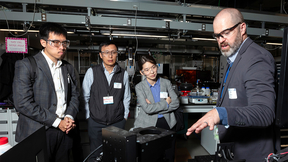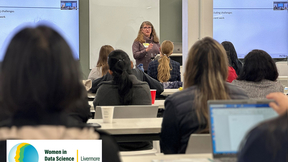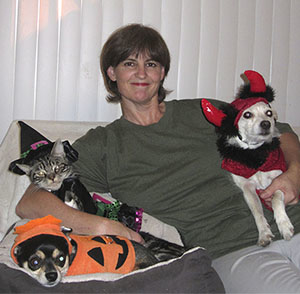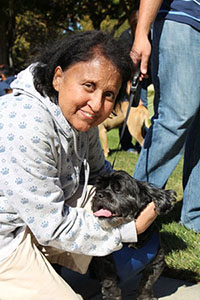Giving animals in need a HOME
The annual HOME campaign doesn't just provide assistance to local non-profit agencies and umbrella groups that serve humans -- the campaign also provides support to some of the area's smallest and furriest residents.
Lab employees Vira Okuda and Sheri Savage have dedicated themselves to helping those residents through their efforts with area animal rescues.
Okuda, a computer associate with Computation's Applications, Simulations and Quality Division, is a longtime member of Lucky Dog Rescue, a nonprofit organization with a mission to eliminate the unnecessary euthanasia of adoptable homeless animals throughout Northern California. The organization saves more than 100 dogs each year and networks to assist in the rescue and placement of many others.
After traveling internationally and seeing dogs in underdeveloped countries living in horrible conditions, Okuda felt compelled to help them. She tried, but realized that helping animals a world away was virtually impossible.
"I wanted to gather them up and bring them home with me, but I knew I couldn't," Okuda said. "I didn't want to obsess about doing something...I wanted to actually do something."
She realized that while she couldn't help the dogs she saw on her travels, she could help others at home. Okuda got her start as a dog foster in 1998. She was initially heartbroken to train her first foster, a Doberman, only to adopt her out but soon accepted that it is her purpose.
"You can't be upset because that's how it works," Okuda said. "You save their lives, you show them love and you adopt them out. It really should be a revolving door."
Lucky Dog Rescue's slogan says it all -- "A new home, a second chance at life" -- and Okuda has given more than 80 dogs that second chance. She usually fosters two dogs at a time, giving them a stable home to recover from the stress of shelter life and a chance to learn or refresh basic commands. Okuda, who is deaf, also teaches her fosters hand signals. This process prepares the animals for a successful adoption.
"Volunteering at the adoption events and becoming a foster family for homeless pets is very rewarding and challenging experience," Okuda said. "You meet new pets, learn their stories and cultivate your own space in their hearts as they find a place in yours."
Savage, a system administrator in Global Security, became a foster parent when her 14-year-old daughter asked if fostering was something that their family could do. Nearly 10 years later, her daughter is grown and out of the house and Savage is still fostering animals.
"It was a great family experience," Savage said. "It's exciting to be able to step in and do something for animals in need."
Savage is affiliated with East of Eden K9 Rescue, a companion animal rescue founded in 2001. The organization works with dogs and cats from the community at large and from the shelters in their service area, which extends from Brentwood in eastern Contra Costa County to Santa Nella in Merced County. Most of the organization's foster families live in the Tracy and Manteca area of the Central Valley where they host their adoption events.
During her time as a foster parent, Savage has welcomed hundreds of animals into her home. Dogs and cats are socialized, house trained and given basic obedience training. Puppies and kittens are placed in an enriched environment to optimize their physical and mental development.
The foster model, rather than a kennel or shelter, makes the transition to a new adoptive home much easier and gives the animals a better chance of finding their "forever" homes. East of Eden takes special care in ensuring the fit between animal and adopter, even offering free behavioral consultation for the duration of the animal's life.
"Many people feel they cannot foster because it would be too hard to let the animal go," Savage said. "Unfortunately, we cannot save them and keep them all, as much as we want to some times. The next best thing we can do to help the animals is to be able to place them in loving homes and then be able to rescue another one in need. It is extremely rewarding work for an animal lover to be involved with this kind of volunteer work. We also get to meet so many wonderful adopters who are passionate about saving a life through adoption."
Every animal saved makes room for another animal in need, and both organizations are in need of foster parents. If fostering is not for you, but you want to help in the mission to save animals and give them a second chance in a loving home, there are many other opportunities to help, such as donating time and skills for website maintenance, social media marketing, fundraising planning, photography or monetary or food donations.
For background on the organizations, a list of adoptable animals or information on becoming a foster parent or volunteer, visit Lucky Dog Rescue or East of Eden .
Contact
Breanna Bishop[email protected]
925-423-9802
Related Links
Lucky Dog RescueEast of Eden
Tags
PhilanthropyCharity
HOME Campaign
Community Outreach
Featured Articles










